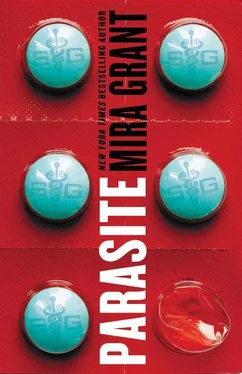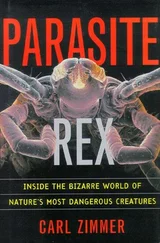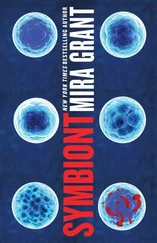Some of them were making sounds. Little squeaks and gasps, for the most part, although at least one of them was moaning, a low, constant noise that ebbed and rose with the moaner’s breathing. I couldn’t tell which one was making the sound, and I was glad. It would have been almost impossible to fight the urge to grab a pillow and make the moaning stop. Someone else was giggling. That was less disturbing, somehow, even though the sound was flat and without any trace of humor.
One of the technicians walked over to join us, clutching a clipboard against her chest as she approached. She stopped a few feet away, saluting my father. “Colonel Mitchell, sir,” she said.
“At ease,” said my father. “You remember my eldest daughter, Sally.”
“Of course, Colonel,” said the woman, and gave me a nod. “Hello, Sally.” If she thought it was strange that my father was taking me for a sightseeing trip in an isolation ward, she didn’t say anything about it. Being the boss apparently came with some privileges.
“Dr. Snyder, Sally is here because she may be able to demonstrate a mechanism for testing for the sleepwalking sickness,” said my father, as calmly as if everything around us was completely normal. The sleepwalkers continued to writhe against their restraints, clawing and gnashing and striking at the air as best they could. I shrank a bit farther down into myself. He couldn’t really want me to go near them, could he? To touch them?
“Colonel Mitchell, this is highly irregular. I—”
“She saw the test at SymboGen,” said Joyce. Her tone wasn’t one I’d heard before: it was the same mix of authority and arrogance that I heard from Dad when he was on the phone with his military contacts… and that I heard from Dr. Banks, when he was trying to get me to do what he wanted. It made her sound older, and scarier, like she was a part of the establishment.
Which, technically, I suppose she was.
Joyce continued: “This is the first lead we’ve had toward finding a physical sign of infection. We know these people are ill. If they show as positive on Sally’s test, we can begin testing asymptomatic individuals. This could put our preventative measures forward by a matter of weeks, if not months.”
“I don’t want to do this,” I whispered. My voice was barely audible, even to myself.
My father looked at me. There was a cold sympathy in his eyes, like he understood my dilemma, and even cared about it, but couldn’t justify doing any more than that. “I know you don’t, Sally,” he said calmly. “The trouble is, you don’t have a choice. Your country needs you.”
My country had never needed me before. I shrank down farther, the sound of drums pounding in my ears.
Dr. Snyder nodded once, accepting her orders, and asked, “What will you need?”
“Sally?”
I glanced up again and said, “A UV wand, and someone to dim the lights. Not all the way, just enough that we can see bioluminescence.”
“Of course.” Dr. Snyder turned and walked away from us, presumably to arrange for what I’d requested.
“Pick a subject, Sally,” said my father.
They’re not subjects, they’re people, I thought. I didn’t say anything. Whether they were people in the classic sense or Dr. Cale’s people who’d passed through the broken doors, becoming monsters, it didn’t matter. They were sick and confused, and they couldn’t be trusted without the restraints. They would hurt us if we let them.
I looked around the room, finally settling on a frail-looking little woman who must have been in her late eighties. “Her,” I said. If she somehow managed to get loose, it was unlikely she’d be able to do much damage before someone could get her restrained again.
My father followed the direction of my gaze, and nodded. “That’s Ms. Lawrence. She’s been here for two weeks. Her family was quite relieved when we offered to take over her care and cover her medical bills, in exchange for being allowed to study the progress of her symptoms.” I shot him a startled look. He shook his head. “No matter what you may think of our work here, Sal, we try to do right by the people who come to us. We don’t have to. Their illnesses will teach us how to prevent hundreds more, and the only way to stay sane in this job is to treat everyone who walks through that door—or is wheeled through—as if they’ve already died. But every single one of us will celebrate the day that someone is able to get up and walk out under their own power. We’re not monsters. We’re just trying to do our jobs.”
He was calling me “Sal” again. I couldn’t tell what that meant. I just shook my head and said, “I want to go home as soon as this is over.” Then I turned and walked toward Ms. Lawrence, inhaling to make myself as narrow as possible as I edged between the cots with their squirming, moaning burdens. I did my best to avoid the biters, and didn’t go anywhere near the man who had pulled his arm free. If he grabbed me… I didn’t want to die the way that Devi had.
The thought of Devi made the cold terror curl through my stomach again, winding itself around my spine. These people were dangerous. Even restrained, they were dangerous, and all of them, even the frail Ms. Lawrence, were upset. I didn’t know why. That wasn’t going to matter if they managed to break loose.
Dr. Snyder met us at Ms. Lawrence’s cot, a UV wand in her hand. “The lights will be dimmed on your order, sir,” she said, offering the wand to my father.
“Thank you,” he said. He took the wand and passed it to me. “Sally?”
“Lights, please,” I half-whispered.
“Lights!” my father repeated, much more loudly. The technicians and doctors who had been moving around the room stopped where they were, except for the few who moved toward us, apparently wanting to see what I was going to do. Someone hit a switch, and the room’s overhead and ambient lighting decreased, slowly shifting us from artificial day into artificial twilight.
“Can someone get her arm, please?” I asked, turning on the UV wand. It hummed silently in my hand, the sound translating itself into a vibration that traveled through my fingers to my wrist. I swept the wand across the front of my shirt to be sure that it was working, and watched the fabric light up like something out of a bad special effect.
“How do you want it?” asked my father, pulling on a pair of plastic gloves as he stepped past me to the moaning, barely squirming Ms. Lawrence.
“Turn it so that the top of her hand is pressed against the cot,” I said.
He did as I had asked, and everyone was silent as I passed the beam above Ms. Lawrence’s arm. As I had expected, the roots of the parasitic infection responsible for her illness showed up immediately, bright white against the dull purple of her skin. They were thinner and less robust than the roots I’d seen on Nathan’s patient, probably because Ms. Lawrence was older, and had fewer resources for the parasite to draw on.
“What in the world…?” breathed my father.
The roots twitched, seeming to respond to the light that was shining over them. They didn’t move much, but they were definitely moving toward the light.
One of the thicker roots jerked toward Joyce. She made a small squeaking noise, taking a half step backward.
“The sleepwalking sickness isn’t. I mean, it’s actually a parasite, sort of,” I said. “It’s the SymboGen implant. It’s… doing things.” I didn’t want to tell them exactly what it was doing, in part because I didn’t understand it without Dr. Cale or Nathan there to explain, and more because I didn’t trust them anymore. Yes, this was my family, and yes, they loved me, but their focus was on the public health. It had to be.
Читать дальше











